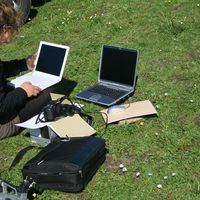Community Assets – Delivering on the Potential? Third sector groups pursuing local development through the ownership and management of ‘community assets’ have become central to local development within and outwith Scotland. Current... more
Community Assets – Delivering on the Potential?
Third sector groups pursuing local development through the ownership and management of ‘community assets’ have become central to local development within and outwith Scotland. Current discourses on assets have tended to privilege infrastructure and land. However, a broader definition of ‘assets’ may also include, for example, extractable minerals, energy, skills in communities, culture, and the natural and built environment. Many of these assets may not necessarily be communally owned in a strictly legal sense, either simply being present within it, or belonging to particular members, or to those resident outside it.
A key challenge is to understand and describe the latent and current ‘value’ of such varied ‘assets’ and asset management. For the creation of successful eco-economies, communities and other kinds of ‘investors’ need to be informed by locally embedded descriptions of ‘value’, understand the potential for development of assets and impacts which go beyond narrow financial considerations. Ownership may not be always be the central issue but setting a ‘value’ or a potential ‘return’ may still be a useful exercise for communities that actively plan their development.
The aim is to explore theoretically and practically the potential to establish ‘eco-economies’ where surplus value circulates locally and/or is reinvested locally.
In partnership with a range of researchers active within the UHI network, CRRS is seeking to explore the current opportunities and barriers encountered by community groups pursuing local development through asset ownership and management. Together we seek to build a capacity within UHI for meeting the needs of the third sector and public agencies active in this field. UHI can build a multi-disciplinary resource to support this local level development work and explore the potential for collaborative research with practitioners instead of about practitioners.
Third sector groups pursuing local development through the ownership and management of ‘community assets’ have become central to local development within and outwith Scotland. Current discourses on assets have tended to privilege infrastructure and land. However, a broader definition of ‘assets’ may also include, for example, extractable minerals, energy, skills in communities, culture, and the natural and built environment. Many of these assets may not necessarily be communally owned in a strictly legal sense, either simply being present within it, or belonging to particular members, or to those resident outside it.
A key challenge is to understand and describe the latent and current ‘value’ of such varied ‘assets’ and asset management. For the creation of successful eco-economies, communities and other kinds of ‘investors’ need to be informed by locally embedded descriptions of ‘value’, understand the potential for development of assets and impacts which go beyond narrow financial considerations. Ownership may not be always be the central issue but setting a ‘value’ or a potential ‘return’ may still be a useful exercise for communities that actively plan their development.
The aim is to explore theoretically and practically the potential to establish ‘eco-economies’ where surplus value circulates locally and/or is reinvested locally.
In partnership with a range of researchers active within the UHI network, CRRS is seeking to explore the current opportunities and barriers encountered by community groups pursuing local development through asset ownership and management. Together we seek to build a capacity within UHI for meeting the needs of the third sector and public agencies active in this field. UHI can build a multi-disciplinary resource to support this local level development work and explore the potential for collaborative research with practitioners instead of about practitioners.
